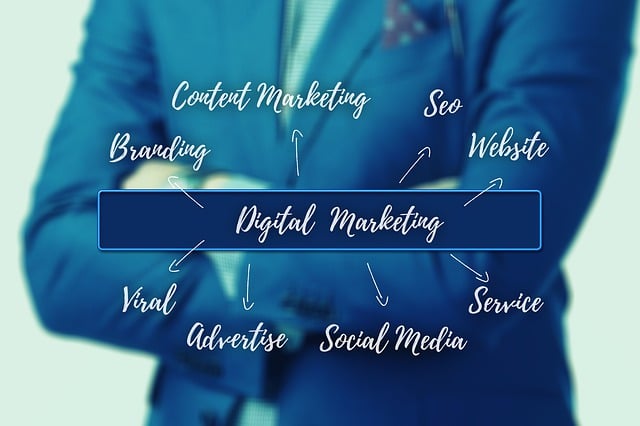
by Justin Mayhall | Jan 13, 2023 | Business Development, Digital Marketing, General Marketing, Startup
A virtual Chief Marketing Officer (vCMO) is a professional who offers marketing expertise to companies on a contract or project basis. They are typically experienced marketing executives who have held C-level positions in the past, and have a wealth of knowledge and skills that they can bring to your business.
The role of a vCMO is to help companies develop and implement effective marketing strategies. This includes conducting market research, identifying target audiences, and developing campaigns that will reach those audiences. They also work closely with other departments within a company, such as sales and product development, to ensure that all marketing efforts are aligned with overall business goals.
One of the main benefits of using a vCMO is that they can bring a fresh perspective to your marketing efforts. They are not tied to the day-to-day operations of your company and can therefore take a step back and see the bigger picture. This allows them to identify new opportunities and areas for growth that might have been overlooked by in-house marketing teams.
Another advantage of working with a vCMO is that they can provide specialized expertise. Many vCMOs have experience in specific industries or marketing channels, such as digital marketing or event planning. This means that they can provide valuable insights and strategies that are tailored to your business and its unique needs.
One of the most important functions of a vCMO is to create a comprehensive marketing plan. This plan should include a detailed analysis of your target audience, your competition, and your company’s unique selling points. It should also outline specific goals and objectives for your marketing efforts, as well as the tactics and strategies that will be used to achieve them.
A vCMO will also help you to develop a brand strategy which will help you to define your company’s brand and position it in the market place. This will involve creating a consistent message and visual identity that will be used across all marketing channels. This includes developing a brand voice and tone, as well as creating guidelines for the use of your company’s logo and other visual elements.
Aside from branding, a vCMO can also assist you to develop a digital marketing strategy. This will involve identifying the best channels for reaching your target audience, such as social media, email marketing, or search engine optimization. They will also help you to create and execute campaigns that will drive traffic to your website and increase conversions.
Another key function of a vCMO is to help you to measure and analyze the success of your marketing efforts. This includes setting up tracking systems to monitor website traffic, conversion rates, and other metrics. A vCMO can also help you to analyze the data and make adjustments to your marketing strategy as needed.
In addition to these specific functions, a vCMO can also provide a wide range of other services. This can include things like event planning, public relations, and crisis management. They can also help you to develop and manage partnerships with other companies and organizations.
In conclusion, a virtual Chief Marketing Officer (vCMO) is a valuable resource for companies that want to improve their marketing efforts. They can provide specialized expertise, a fresh perspective, and a wealth of knowledge and skills that can help to drive business growth. Whether you are a small startup or a large corporation, working with a vCMO can help you to achieve your marketing goals and achieve success in the marketplace.

by Lindsay Mayhall | Dec 29, 2022 | Digital Marketing
Psychology in marketing is a vital aspect for businesses to understand in order to effectively target and engage with their audience. By understanding how decisions are made, businesses can tailor their marketing strategies and campaigns to appeal to their customers on a deeper level.
One of the key psychological principles in marketing is the concept of cognition, or the mental processes involved in acquiring, processing, and storing information. This includes attention, perception, memory, and decision-making. In order to make a purchase, customers must first be aware of a product or service, then perceive it as valuable or useful, and finally remember it when they are ready to make a decision.
Attention is the first step in the process of cognition. In order for a marketing message to be effective, it must first capture the attention of the audience. This can be achieved through various techniques, such as using eye-catching visuals or creating a sense of urgency.
Perception is the process of interpreting and organizing sensory information in order to understand and make sense of the environment. In marketing, this involves creating a positive perception of a product or service in the mind of the customer. This can be achieved through various techniques, such as highlighting the benefits or features of the product, or using social proof (such as customer testimonials) to show that others have had a positive experience with the product.
Memory is an important aspect of cognition as it allows us to retain information over time. In marketing, this can be used to create brand recognition and loyalty. By consistently presenting a clear and cohesive brand message, businesses can increase the chances of customers remembering their brand and returning to make future purchases.
Decision-making is the final step in the process of cognition, and is influenced by various factors such as personal values, beliefs, and past experiences. In marketing, understanding these factors can help businesses tailor their marketing messages and campaigns to appeal to the specific needs and desires of their target audience.
One psychological concept that is particularly relevant to decision-making is the concept of motivation. Motivation refers to the internal and external factors that drive an individual to take action. In marketing, understanding what motivates a customer can help businesses tailor their marketing messages to appeal to these motivations and increase the chances of making a sale.
Another important psychological concept in marketing is the concept of emotions. Emotions play a significant role in decision-making and can greatly influence whether or not a customer decides to make a purchase. By creating an emotional connection with their audience, businesses can increase the chances of making a sale. This can be achieved through various techniques, such as storytelling or creating a sense of nostalgia.
In addition to cognition and motivation, psychology in marketing also includes the study of consumer behavior. Consumer behavior refers to the actions and decisions made by individuals when purchasing a product or service. By understanding consumer behavior, businesses can better understand what drives their customers to make a purchase and tailor their marketing strategies accordingly.
One key aspect of consumer behavior is the concept of personality. Personality refers to the unique characteristics that define an individual, including their values, beliefs, and attitudes. In marketing, understanding the personality of a customer can help businesses tailor their marketing messages to appeal to their specific personality traits.
Another important aspect of consumer behavior is the concept of attitudes. Attitudes are a person’s overall evaluation of a product or service, and can be either positive or negative. In marketing, understanding a customer’s attitudes towards a product can help businesses tailor their marketing messages to appeal to their specific attitudes and increase the chances of making a sale.
In conclusion, psychology in marketing is a vital aspect for businesses to understand in order to effectively target and engage with their audience.

by Justin Mayhall | Dec 29, 2022 | Digital Marketing, Website
Your website is your most important digital marketing asset. It’s where you present yourself to the world, it’s what people will see when they search for you online and it’s the first place they should go when they want to learn more about what you do.
Your website is also one of the most cost-effective ways to reach new customers. It’s easy to create a great website and promote it through SEO, social media and blogging. As a result, it’s no wonder that so many businesses are focusing on their websites as an effective way to grow their business.
Here are some key reasons why everyone should have a website:
Your Website is Your First Impression
Much like when you first walk into a store, your website gives you the opportunity to impress your visitors and showcase exactly what you have to offer. I can’t even begin to count how many times I’ve seen multi-million dollar companies that have websites that look like they were built in the ‘90s! If a website isn’t mobile friendly, only has a few basic pages or doesn’t effectively communicate your value propositions, then you are definitely leaving money on the table.
The worst part is that when I see websites that are in dire need of a revamp, people normally don’t even know how many customers they are losing because they don’t have the most basic website tracking capabilities.
The truth is, even if you have a physical location where customers can visit your store, most likely they are visiting your website long before they step foot in your store, and if you offer goods and/or services without a customer-facing location then your website without a doubt needs to function as a business tool that converts visitors into customers.
Your Website is Your Salesperson
Long gone are the days of websites simply providing basic information on what your business does. In today’s digital age, a website must be capable of leading visitors through several (if not all) stages of the customer journey.
When a potential customer arrives at your website, it must first answer the basic questions that they are looking to solve. After that, it should lead them down a path that explains exactly why they should choose your business to solve the problem they are facing.
This is accomplished by a strategic use of text, images, videos, infographics, statistics, testimonials, customer success stories, case studies and a multitude of other tactics all while providing a visually appealing and easy to navigate site for your visitors.
Your website is an opportunity to establish yourself as an expert in your industry or niche by providing valuable content such as case studies and tutorials for others who want to learn from your experience.
Build Trust with Potential Customers: A well-designed website will help build trust with potential customers because it shows them how professional you are by displaying your logo and other branding elements that represent who you are as a business.
You Website can be a Powerful Marketing Tool
Marketing can be expensive. Whether it’s SEM, PPC, PPL, email or any other form of digital marketing, there is no shortage of ways to spend your money driving traffic to your website. However, as I’ve highlighted in other posts, this money can easily be wasted if you don’t have a website that converts visitors into customers.
The most important metric you can understand when it comes to your website is its conversion rate. How many visitors come to your site versus how many take the action you want them to take. Once you have a firm grasp on that number you can begin to understand the journey your visitors are taking on your site and where and when they may be leaving.
This is where content comes into play. Not only can you begin to create more engaging content to help convert visitors into customers, but also your content can help drive more traffic organically through SEO.
The key is quality over quantity. So many companies charge exorbitant fees to help you rank your website on web searches. At the end of the day just make sure your website is providing authentic and informational content to your visitors on a consistent basis.
The Takeaway
Potential clients will look at your website and make a judgment on your professionalism and industry knowledge. So make sure you’re providing an up-to-date site that looks good, is easy to navigate, mobile friendly and informative.
That’s it.




Recent Comments